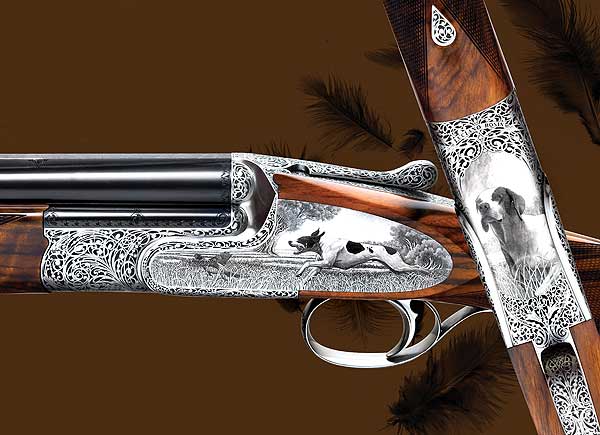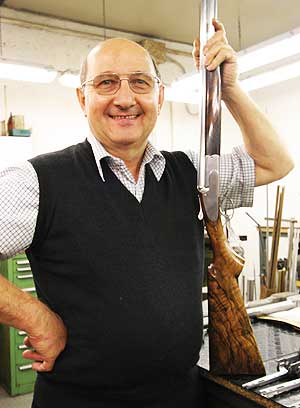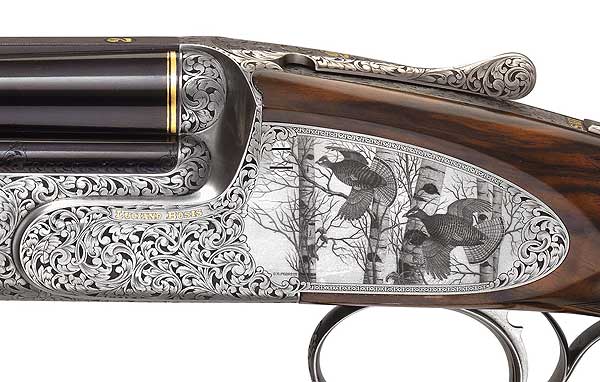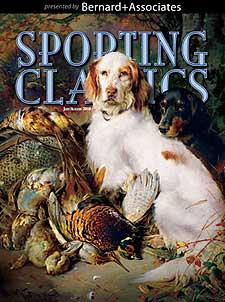Guns With Souls – Italy’s Luciano Bosis’s Exquisite Double Guns
by Larry Chesney
Presented by Bernard+Associates


Columbia, SC –-(AmmoLand.com)- The bells of the nearby Catholic church ring twice in the background, signaling two o’clock on this sunny Italian afternoon.
The sound mimics the small hammers tapping away, steel on steel, in the little workshop at 32 Via G. Marconi in Travagliato, on the outskirts of Brescia.
It’s Friday and the artisans and craftsmen are beginning to wind down for the weekend. Cutting and drilling machines have been silenced, and father and daughter are chatting over a newly completed .410 over-and-under. The shotgun is beautiful and delicate and balanced, with precise fittings and exquisite scrollwork. The gunmaker holds his creation and smiles proudly, like a new papa.

If you were to picture in your mind an Italian custom gunmaker, there’s a good chance the image would resemble Luciano Bosis – diminutive in height, stout in frame, bespectacled and balding, with a near constant smile that quietly states, “I love this job.”
Inspired by the classic English guns of Holland & Holland and Anson & Deeley, he has created his own style of side-by-sides, as well as over-and-unders. His sharp eye, technical expertise and desire for perfection in each gun has earned him an international reputation for superb design and performance.
His shop lies across a grassy courtyard from the back door of his home. With its patio adorned with flowers and leisurely furnishings, the home seem miles from any sort of metalworking business. And in a way it is, as the little shop of Bosis is more a studio than a factory.
But whether it’s firearms, pottery or paintings, along with any kind of art comes the reality of business. No “art for art’s sake,” especially to the gunmaker. Because Luciano cannot speak English and would much rather spend his time around guns than spreadsheets, his daughter Laura handles everything on the business end.
Asked about her role at the shop, Laura Bosis said quite simply, “I am the office.”
Because Laura’s English is still rather sketchy, our hostess, Veronica Gelmini of S.I.A.C.E., was on hand to help with translations. I asked Veronica the questions and she gathered the responses from Luciano and Laura.
“Along with handling the orders, controlling the money and answering the phone,” Laura said in fast-flowing Italian, “I’m also involved in production. I follow production of each gun step by step, decide which client needs to be first or which gun has to be started.”
She mentioned an elderly gentleman who requested a custom Michelangelo over-and-under, but couldn’t wait for years to receive it. Time was of the essence in his case, so she moved him up in the line.

Her responsibility also includes gathering the many components for the final product.
“I take care of ordering the correct parts, actions, barrels, the wood, and I line up the engraving,” Laura said. “I make sure that everything, every detail, is done to the client’s satisfaction.”
Despite her limited English, she is the face of Bosis to the rest of the world, and must make certain that nothing is lost in translation.
“Often a project involves an American customer,” she said, “and Bosis wants to maintain our high standing in the States. I can’t forget something, or let something slip through, because that will make the customer unhappy. I have to cover each detail, from production to shipping.”
“Ten years ago people were fine with whatever they received. But nowadays, they know much more about guns and require more specific characteristics in a custom gun. Finishing, balance, fit, wood, engraving . . . I must attend to every detail, no matter how small.”
Like most custom gunmakers of the valley, Luciano learned his trade in the hire of established gunmakers. He was only 12 when he began apprenticing at the shop of Galesi in Brescia. After that he worked at Perazzi, where he was put in charge of his own department.
By age 20 Luciano was an accomplished craftsman who had devoured every book available about gunmaking. While at Perazzi, he had turned a portion of his home into a workshop.
“I used to work at the factory in the mornings and started doing repairs and production on my own at night,” Luciano remembered.
In 1977 he left Perazzi, “hung his shingle” and set out to build his own top-quality sporting guns – guns that he hoped would rival the best in the world.
Luciano’s first two guns were 12-bore side-by-sides. Over the next few years he begin attending trade shows, such as EXA in Brescia and IWA in Nurenberg. He still remembers the phone ringing after a trip to EXA in 1980. His first sale!
Later that year Frank Pachmeyer, America’s master gunsmith at the time, saw the first Bosis over-and-under and ordered ten more. Luciano’s dream had become a reality. And as his smile will tell you today, he loves his work more than ever.
After touring the workshop, we gathered with the family in the shadows of the patio. Luciano’s wife, Giuliana, served a light snack as we continued our conversation. Her warm blue eyes smiling from beneath a shock of white hair, she seemed the prototypical Italian matriarch, with lines of character etched by her own years of hard work. She was the ideal hostess, making certain that all were cool and comfortable.
As we sipped on bottles of San Pelligrino mineral water, I asked Laura how many people are employed at their shop. She explained that in the mornings, seven people, including Luciano and herself, work there. In the afternoons three part-timers depart, but they often carry work home.
“These are artisans,” she said, “and they sometimes get the spirit at odd times, say three in the morning. It’s not unheard of for a walnut stock to be completed in the middle of the night.”
“We believe a truly fine gun must be both esthetically and mechanically perfect,” said Luciano. “Mechanical perfection can only be achieved by using the latest advancements in material science and machining technology. The Brescia area is a center for this technology.
“By using outside partnerships for machining, we will always have state-of-the-art technology. Our new Challenger, a lightweight, low-recoil titanium sidelock, was only possible due to the use of new “Maraging” steel alloy for the barrels.”
While the gunmaking process at Bosis is considerably slower and more painstaking than that of larger companies, Luciano prefers his shop’s measured pace and limited output. From soldering the barrels and ribs to fitting the barrels, from hand-polishing the metal and wood to the engraving – the operations performed by skilled hands could never be duplicated by machine.
“Handcrafted guns . . . ” said Luciano, “each has a soul.”
The Making Of A Michelangelo
Available in all gauges on scaled actions, the Michelangelo is fashioned after the original 1909 Boss gun of London, considered my many to be the over-and-under par excellence.
One of the Michelangelo’s most appealing features is its Boss-type side fin. A 30mm steel bar is cut to a length of 850mm before being heated and forged to create the lump, which forms the breach of both barrels. A straight-flute drill is used to bore the barrels, and off-site CNC millers create the barrel hooks. The solid, hand-checkered top rib and two solid side ribs are then mounted.

Bosis has designed his barrel hooks to fit deeper in the frame, making the gun much smoother to open. It’s also standard practice, unless otherwise specified, to chrome only the inside of the chambers as it is believed that the chrome may stiffen the barrels and prevent the chokes from being replaced at a later date. This method also precludes the need for frequent cleaning, though Bosis advises that it’s a good practice to apply a film of protective oil after each use.
The case-hardened steel frame is milled using a CNC machine and the tang is one piece – a refined feature in “Best guns.” The frame is then worked slowly and painstakingly until it fits the barrel precisely.
Two thin side slides are used to cock the hammers. This feature was designed to optimize the mechanical operations and to keep the dimensions and couplings precise. The sideplate and bridle are made from a solid piece of steel and are hand-detachable with a rear-facing V-spring and safety sear. The single trigger mechanism operates the trigger pull by means of a 1,500-gram weight for the first round and 1,800-gram weight for the second shot.
The final touches are carried out by some of the world’s finest engravers, including Pedretti, Galeazzi, Naida and Creative Art.




Editor’s Note: To find out more about Fabbrica Armi Luciano Bosis, visit www.bosis.com, email info@bosis.com, or call 030-660413. In the U.S., visit www.griffinhowe.com or www.williamlarkinmoore.com.

About:
Sporting Classics is the magazine for discovering the best in hunting and fishing worldwide. Every page is carefully crafted, through word and picture, to transport you on an unforgettable journey into the great outdoors.
Travel to the best hunting and fishing destinations. Relive the finest outdoor stories from yesteryear. Discover classic firearms and fishing tackle by the most renowned craftsmen. Gain valuable knowledge from columns written by top experts in their fields: gundogs, shotguns, fly fishing, rifles, art and more.
From great fiction to modern-day adventures, every article is complemented by exciting photography and masterful paintings. This isn’t just another “how to” outdoor magazine. Come. Join us! Visit: www.sportingclassics.net
